Contemporary Accounting Issue Report: Climate Change and Agency Theory
VerifiedAdded on 2020/03/01
|10
|2074
|147
Report
AI Summary
This report delves into the contemporary accounting issue of climate change, examining its implications through the framework of agency theory. It explores how carbon emissions and environmental factors affect financial statements and corporate governance. The study highlights the principal-agent relationship, particularly focusing on the roles of accountants, managers, and auditors in addressing climate-related risks. The report discusses practical and theoretical motivations, reviews relevant literature, and proposes hypotheses regarding target slack and performance-based incentives. It emphasizes the importance of understanding climate change's economic aspects, conducting cost-benefit analyses, and ensuring the reliability of financial information through audits. The analysis includes discussions on moral hazard, information asymmetry, and the role of contracts in mitigating agency problems. The report concludes by outlining the hypotheses for the study, which investigate the relationship between target slack and factors such as the initial setting of targets and the presence of performance-based incentives.
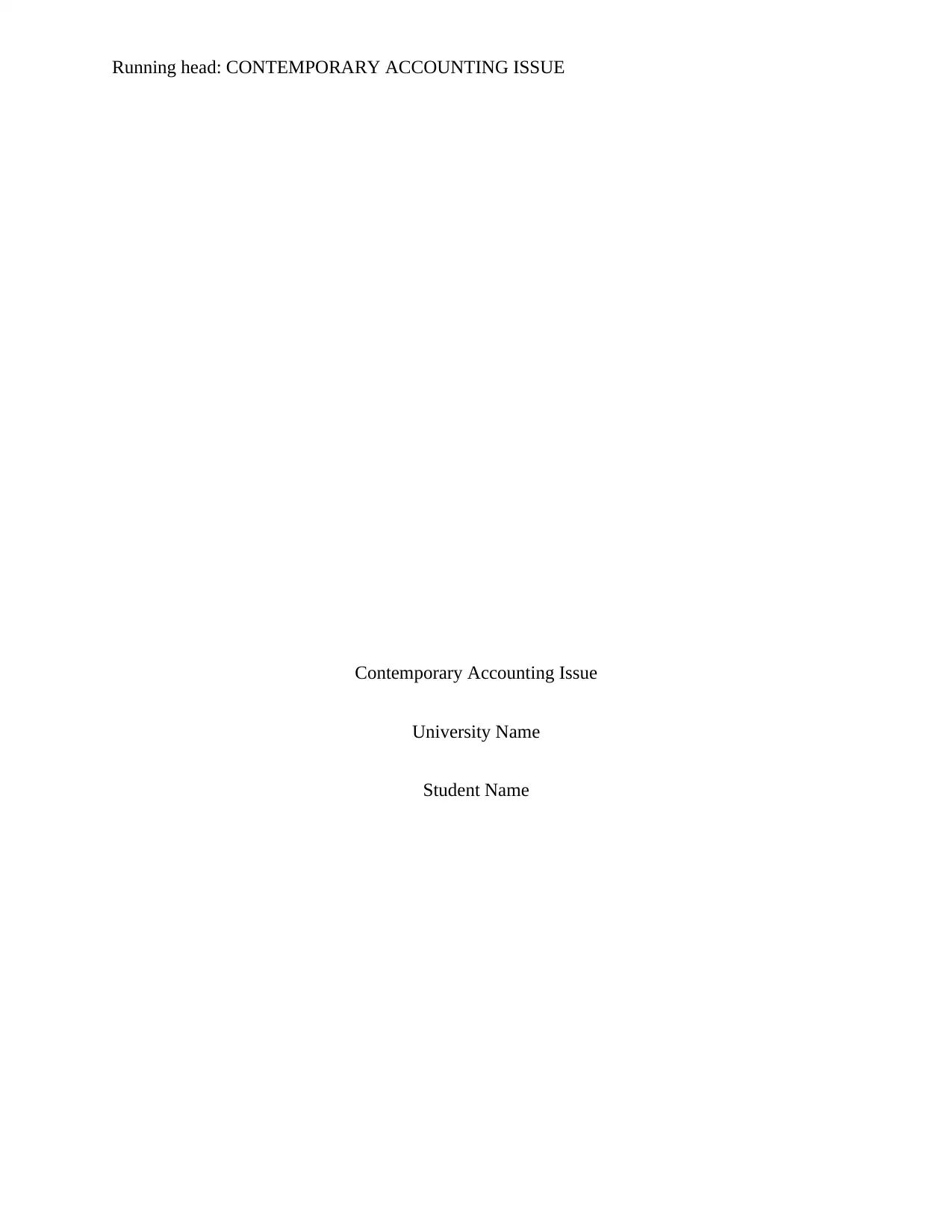
Running head: CONTEMPORARY ACCOUNTING ISSUE
Contemporary Accounting Issue
University Name
Student Name
Contemporary Accounting Issue
University Name
Student Name
Paraphrase This Document
Need a fresh take? Get an instant paraphrase of this document with our AI Paraphraser
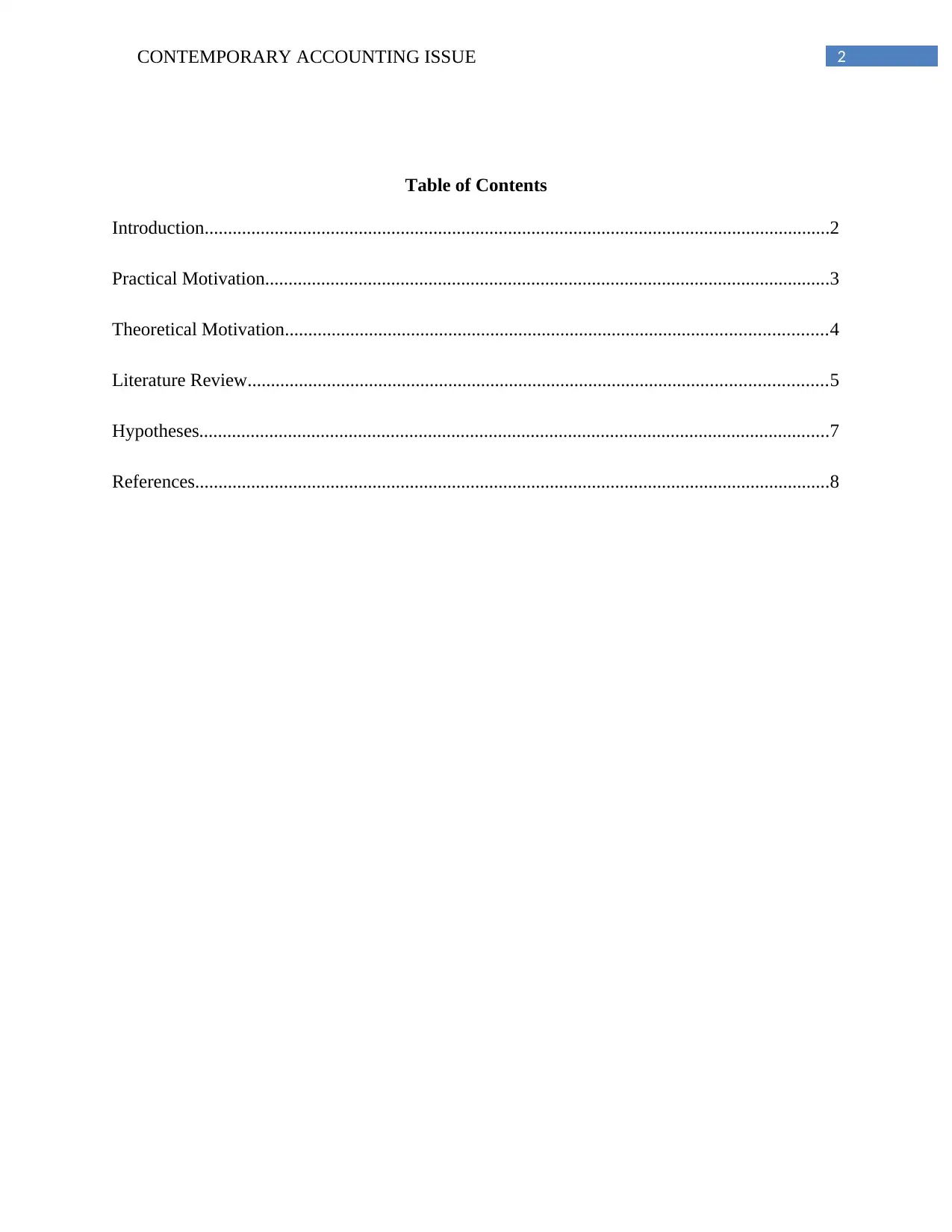
2CONTEMPORARY ACCOUNTING ISSUE
Table of Contents
Introduction......................................................................................................................................2
Practical Motivation.........................................................................................................................3
Theoretical Motivation....................................................................................................................4
Literature Review............................................................................................................................5
Hypotheses.......................................................................................................................................7
References........................................................................................................................................8
Table of Contents
Introduction......................................................................................................................................2
Practical Motivation.........................................................................................................................3
Theoretical Motivation....................................................................................................................4
Literature Review............................................................................................................................5
Hypotheses.......................................................................................................................................7
References........................................................................................................................................8
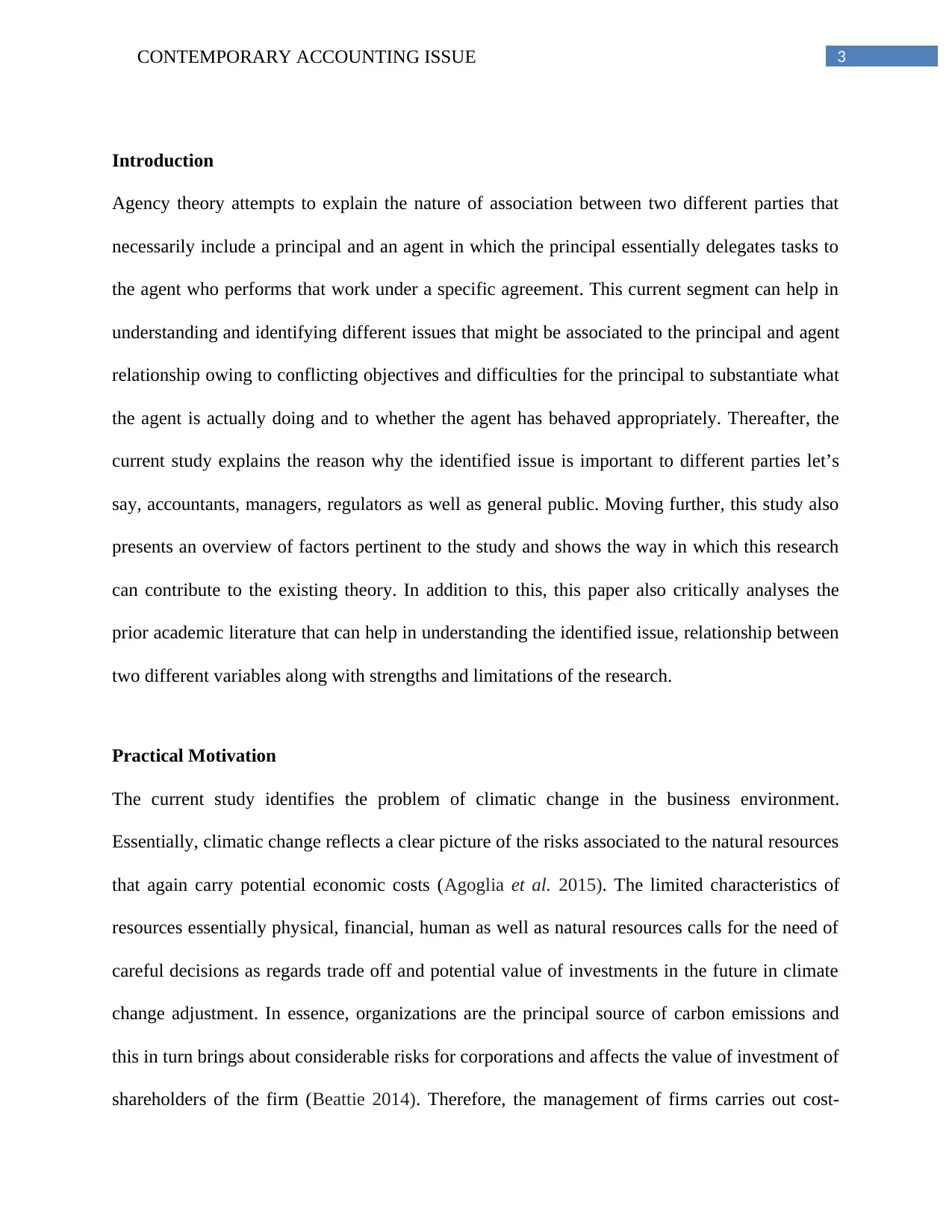
3CONTEMPORARY ACCOUNTING ISSUE
Introduction
Agency theory attempts to explain the nature of association between two different parties that
necessarily include a principal and an agent in which the principal essentially delegates tasks to
the agent who performs that work under a specific agreement. This current segment can help in
understanding and identifying different issues that might be associated to the principal and agent
relationship owing to conflicting objectives and difficulties for the principal to substantiate what
the agent is actually doing and to whether the agent has behaved appropriately. Thereafter, the
current study explains the reason why the identified issue is important to different parties let’s
say, accountants, managers, regulators as well as general public. Moving further, this study also
presents an overview of factors pertinent to the study and shows the way in which this research
can contribute to the existing theory. In addition to this, this paper also critically analyses the
prior academic literature that can help in understanding the identified issue, relationship between
two different variables along with strengths and limitations of the research.
Practical Motivation
The current study identifies the problem of climatic change in the business environment.
Essentially, climatic change reflects a clear picture of the risks associated to the natural resources
that again carry potential economic costs (Agoglia et al. 2015). The limited characteristics of
resources essentially physical, financial, human as well as natural resources calls for the need of
careful decisions as regards trade off and potential value of investments in the future in climate
change adjustment. In essence, organizations are the principal source of carbon emissions and
this in turn brings about considerable risks for corporations and affects the value of investment of
shareholders of the firm (Beattie 2014). Therefore, the management of firms carries out cost-
Introduction
Agency theory attempts to explain the nature of association between two different parties that
necessarily include a principal and an agent in which the principal essentially delegates tasks to
the agent who performs that work under a specific agreement. This current segment can help in
understanding and identifying different issues that might be associated to the principal and agent
relationship owing to conflicting objectives and difficulties for the principal to substantiate what
the agent is actually doing and to whether the agent has behaved appropriately. Thereafter, the
current study explains the reason why the identified issue is important to different parties let’s
say, accountants, managers, regulators as well as general public. Moving further, this study also
presents an overview of factors pertinent to the study and shows the way in which this research
can contribute to the existing theory. In addition to this, this paper also critically analyses the
prior academic literature that can help in understanding the identified issue, relationship between
two different variables along with strengths and limitations of the research.
Practical Motivation
The current study identifies the problem of climatic change in the business environment.
Essentially, climatic change reflects a clear picture of the risks associated to the natural resources
that again carry potential economic costs (Agoglia et al. 2015). The limited characteristics of
resources essentially physical, financial, human as well as natural resources calls for the need of
careful decisions as regards trade off and potential value of investments in the future in climate
change adjustment. In essence, organizations are the principal source of carbon emissions and
this in turn brings about considerable risks for corporations and affects the value of investment of
shareholders of the firm (Beattie 2014). Therefore, the management of firms carries out cost-
⊘ This is a preview!⊘
Do you want full access?
Subscribe today to unlock all pages.

Trusted by 1+ million students worldwide
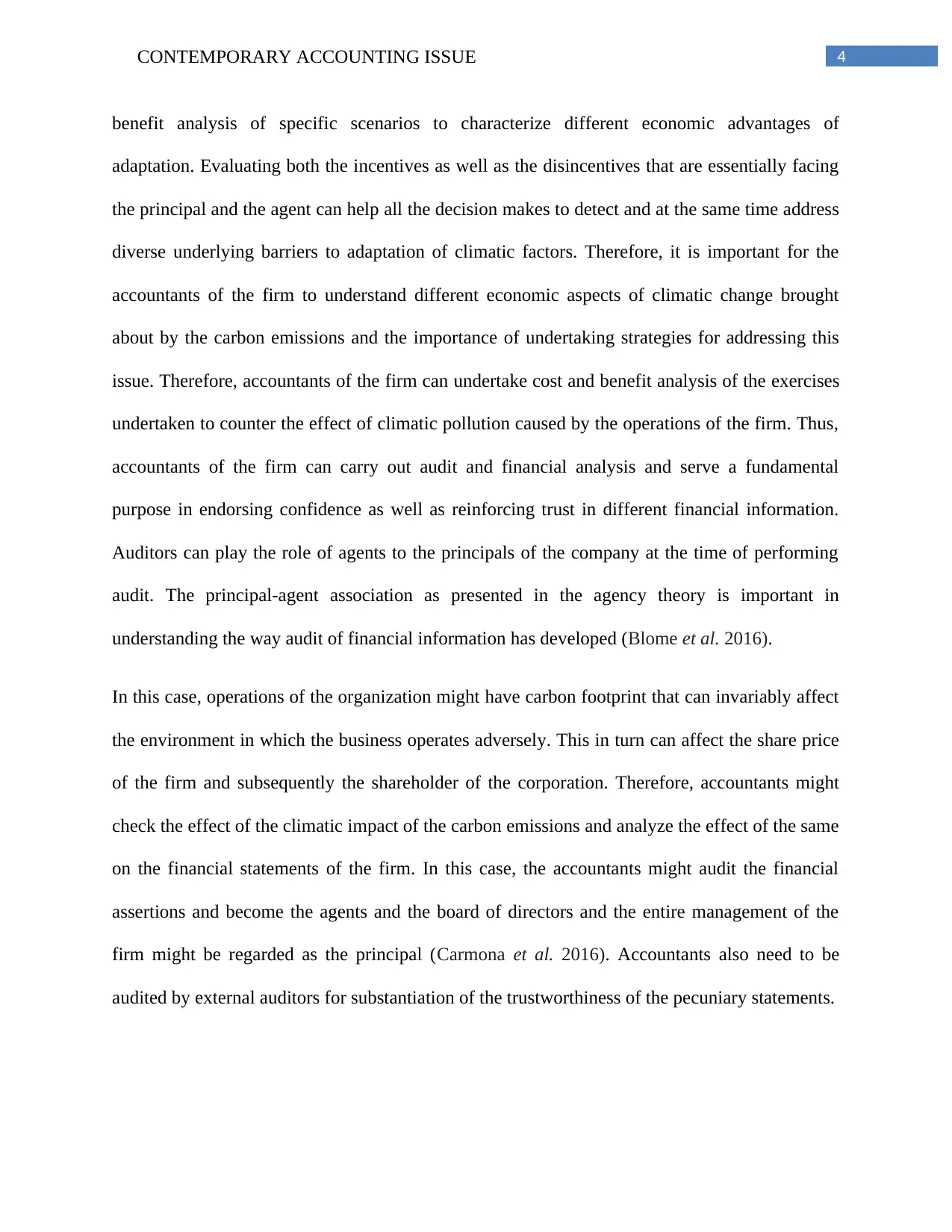
4CONTEMPORARY ACCOUNTING ISSUE
benefit analysis of specific scenarios to characterize different economic advantages of
adaptation. Evaluating both the incentives as well as the disincentives that are essentially facing
the principal and the agent can help all the decision makes to detect and at the same time address
diverse underlying barriers to adaptation of climatic factors. Therefore, it is important for the
accountants of the firm to understand different economic aspects of climatic change brought
about by the carbon emissions and the importance of undertaking strategies for addressing this
issue. Therefore, accountants of the firm can undertake cost and benefit analysis of the exercises
undertaken to counter the effect of climatic pollution caused by the operations of the firm. Thus,
accountants of the firm can carry out audit and financial analysis and serve a fundamental
purpose in endorsing confidence as well as reinforcing trust in different financial information.
Auditors can play the role of agents to the principals of the company at the time of performing
audit. The principal-agent association as presented in the agency theory is important in
understanding the way audit of financial information has developed (Blome et al. 2016).
In this case, operations of the organization might have carbon footprint that can invariably affect
the environment in which the business operates adversely. This in turn can affect the share price
of the firm and subsequently the shareholder of the corporation. Therefore, accountants might
check the effect of the climatic impact of the carbon emissions and analyze the effect of the same
on the financial statements of the firm. In this case, the accountants might audit the financial
assertions and become the agents and the board of directors and the entire management of the
firm might be regarded as the principal (Carmona et al. 2016). Accountants also need to be
audited by external auditors for substantiation of the trustworthiness of the pecuniary statements.
benefit analysis of specific scenarios to characterize different economic advantages of
adaptation. Evaluating both the incentives as well as the disincentives that are essentially facing
the principal and the agent can help all the decision makes to detect and at the same time address
diverse underlying barriers to adaptation of climatic factors. Therefore, it is important for the
accountants of the firm to understand different economic aspects of climatic change brought
about by the carbon emissions and the importance of undertaking strategies for addressing this
issue. Therefore, accountants of the firm can undertake cost and benefit analysis of the exercises
undertaken to counter the effect of climatic pollution caused by the operations of the firm. Thus,
accountants of the firm can carry out audit and financial analysis and serve a fundamental
purpose in endorsing confidence as well as reinforcing trust in different financial information.
Auditors can play the role of agents to the principals of the company at the time of performing
audit. The principal-agent association as presented in the agency theory is important in
understanding the way audit of financial information has developed (Blome et al. 2016).
In this case, operations of the organization might have carbon footprint that can invariably affect
the environment in which the business operates adversely. This in turn can affect the share price
of the firm and subsequently the shareholder of the corporation. Therefore, accountants might
check the effect of the climatic impact of the carbon emissions and analyze the effect of the same
on the financial statements of the firm. In this case, the accountants might audit the financial
assertions and become the agents and the board of directors and the entire management of the
firm might be regarded as the principal (Carmona et al. 2016). Accountants also need to be
audited by external auditors for substantiation of the trustworthiness of the pecuniary statements.
Paraphrase This Document
Need a fresh take? Get an instant paraphrase of this document with our AI Paraphraser
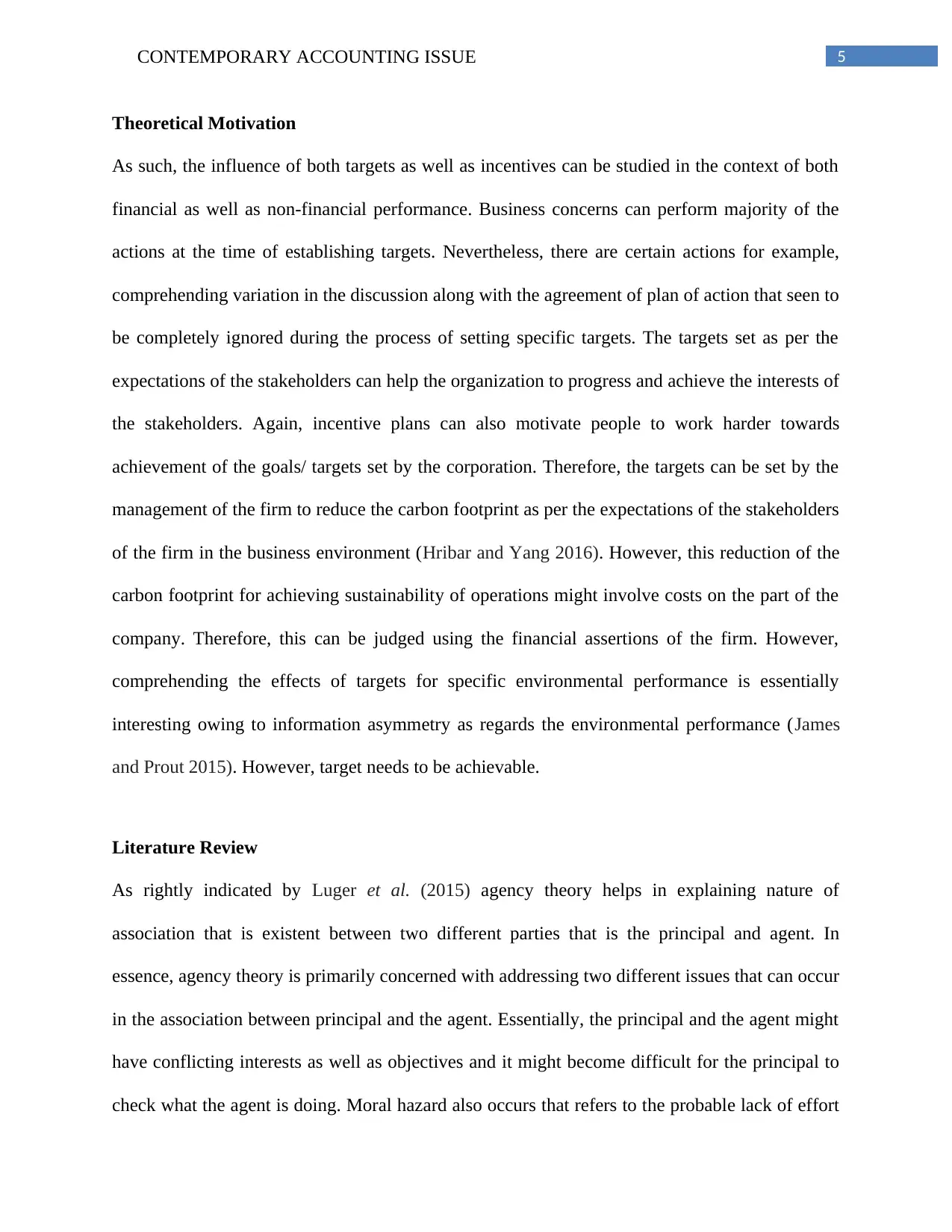
5CONTEMPORARY ACCOUNTING ISSUE
Theoretical Motivation
As such, the influence of both targets as well as incentives can be studied in the context of both
financial as well as non-financial performance. Business concerns can perform majority of the
actions at the time of establishing targets. Nevertheless, there are certain actions for example,
comprehending variation in the discussion along with the agreement of plan of action that seen to
be completely ignored during the process of setting specific targets. The targets set as per the
expectations of the stakeholders can help the organization to progress and achieve the interests of
the stakeholders. Again, incentive plans can also motivate people to work harder towards
achievement of the goals/ targets set by the corporation. Therefore, the targets can be set by the
management of the firm to reduce the carbon footprint as per the expectations of the stakeholders
of the firm in the business environment (Hribar and Yang 2016). However, this reduction of the
carbon footprint for achieving sustainability of operations might involve costs on the part of the
company. Therefore, this can be judged using the financial assertions of the firm. However,
comprehending the effects of targets for specific environmental performance is essentially
interesting owing to information asymmetry as regards the environmental performance (James
and Prout 2015). However, target needs to be achievable.
Literature Review
As rightly indicated by Luger et al. (2015) agency theory helps in explaining nature of
association that is existent between two different parties that is the principal and agent. In
essence, agency theory is primarily concerned with addressing two different issues that can occur
in the association between principal and the agent. Essentially, the principal and the agent might
have conflicting interests as well as objectives and it might become difficult for the principal to
check what the agent is doing. Moral hazard also occurs that refers to the probable lack of effort
Theoretical Motivation
As such, the influence of both targets as well as incentives can be studied in the context of both
financial as well as non-financial performance. Business concerns can perform majority of the
actions at the time of establishing targets. Nevertheless, there are certain actions for example,
comprehending variation in the discussion along with the agreement of plan of action that seen to
be completely ignored during the process of setting specific targets. The targets set as per the
expectations of the stakeholders can help the organization to progress and achieve the interests of
the stakeholders. Again, incentive plans can also motivate people to work harder towards
achievement of the goals/ targets set by the corporation. Therefore, the targets can be set by the
management of the firm to reduce the carbon footprint as per the expectations of the stakeholders
of the firm in the business environment (Hribar and Yang 2016). However, this reduction of the
carbon footprint for achieving sustainability of operations might involve costs on the part of the
company. Therefore, this can be judged using the financial assertions of the firm. However,
comprehending the effects of targets for specific environmental performance is essentially
interesting owing to information asymmetry as regards the environmental performance (James
and Prout 2015). However, target needs to be achievable.
Literature Review
As rightly indicated by Luger et al. (2015) agency theory helps in explaining nature of
association that is existent between two different parties that is the principal and agent. In
essence, agency theory is primarily concerned with addressing two different issues that can occur
in the association between principal and the agent. Essentially, the principal and the agent might
have conflicting interests as well as objectives and it might become difficult for the principal to
check what the agent is doing. Moral hazard also occurs that refers to the probable lack of effort
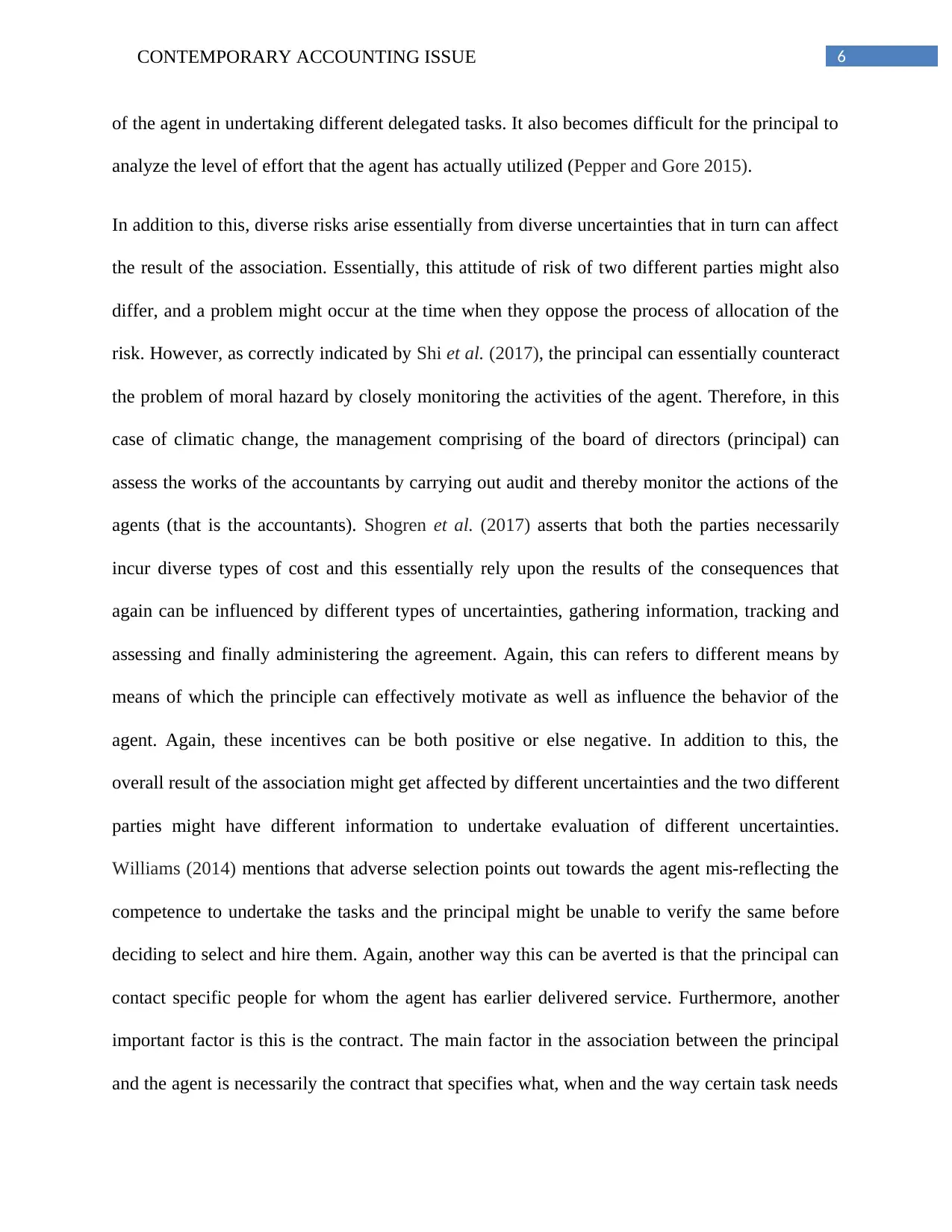
6CONTEMPORARY ACCOUNTING ISSUE
of the agent in undertaking different delegated tasks. It also becomes difficult for the principal to
analyze the level of effort that the agent has actually utilized (Pepper and Gore 2015).
In addition to this, diverse risks arise essentially from diverse uncertainties that in turn can affect
the result of the association. Essentially, this attitude of risk of two different parties might also
differ, and a problem might occur at the time when they oppose the process of allocation of the
risk. However, as correctly indicated by Shi et al. (2017), the principal can essentially counteract
the problem of moral hazard by closely monitoring the activities of the agent. Therefore, in this
case of climatic change, the management comprising of the board of directors (principal) can
assess the works of the accountants by carrying out audit and thereby monitor the actions of the
agents (that is the accountants). Shogren et al. (2017) asserts that both the parties necessarily
incur diverse types of cost and this essentially rely upon the results of the consequences that
again can be influenced by different types of uncertainties, gathering information, tracking and
assessing and finally administering the agreement. Again, this can refers to different means by
means of which the principle can effectively motivate as well as influence the behavior of the
agent. Again, these incentives can be both positive or else negative. In addition to this, the
overall result of the association might get affected by different uncertainties and the two different
parties might have different information to undertake evaluation of different uncertainties.
Williams (2014) mentions that adverse selection points out towards the agent mis-reflecting the
competence to undertake the tasks and the principal might be unable to verify the same before
deciding to select and hire them. Again, another way this can be averted is that the principal can
contact specific people for whom the agent has earlier delivered service. Furthermore, another
important factor is this is the contract. The main factor in the association between the principal
and the agent is necessarily the contract that specifies what, when and the way certain task needs
of the agent in undertaking different delegated tasks. It also becomes difficult for the principal to
analyze the level of effort that the agent has actually utilized (Pepper and Gore 2015).
In addition to this, diverse risks arise essentially from diverse uncertainties that in turn can affect
the result of the association. Essentially, this attitude of risk of two different parties might also
differ, and a problem might occur at the time when they oppose the process of allocation of the
risk. However, as correctly indicated by Shi et al. (2017), the principal can essentially counteract
the problem of moral hazard by closely monitoring the activities of the agent. Therefore, in this
case of climatic change, the management comprising of the board of directors (principal) can
assess the works of the accountants by carrying out audit and thereby monitor the actions of the
agents (that is the accountants). Shogren et al. (2017) asserts that both the parties necessarily
incur diverse types of cost and this essentially rely upon the results of the consequences that
again can be influenced by different types of uncertainties, gathering information, tracking and
assessing and finally administering the agreement. Again, this can refers to different means by
means of which the principle can effectively motivate as well as influence the behavior of the
agent. Again, these incentives can be both positive or else negative. In addition to this, the
overall result of the association might get affected by different uncertainties and the two different
parties might have different information to undertake evaluation of different uncertainties.
Williams (2014) mentions that adverse selection points out towards the agent mis-reflecting the
competence to undertake the tasks and the principal might be unable to verify the same before
deciding to select and hire them. Again, another way this can be averted is that the principal can
contact specific people for whom the agent has earlier delivered service. Furthermore, another
important factor is this is the contract. The main factor in the association between the principal
and the agent is necessarily the contract that specifies what, when and the way certain task needs
⊘ This is a preview!⊘
Do you want full access?
Subscribe today to unlock all pages.

Trusted by 1+ million students worldwide
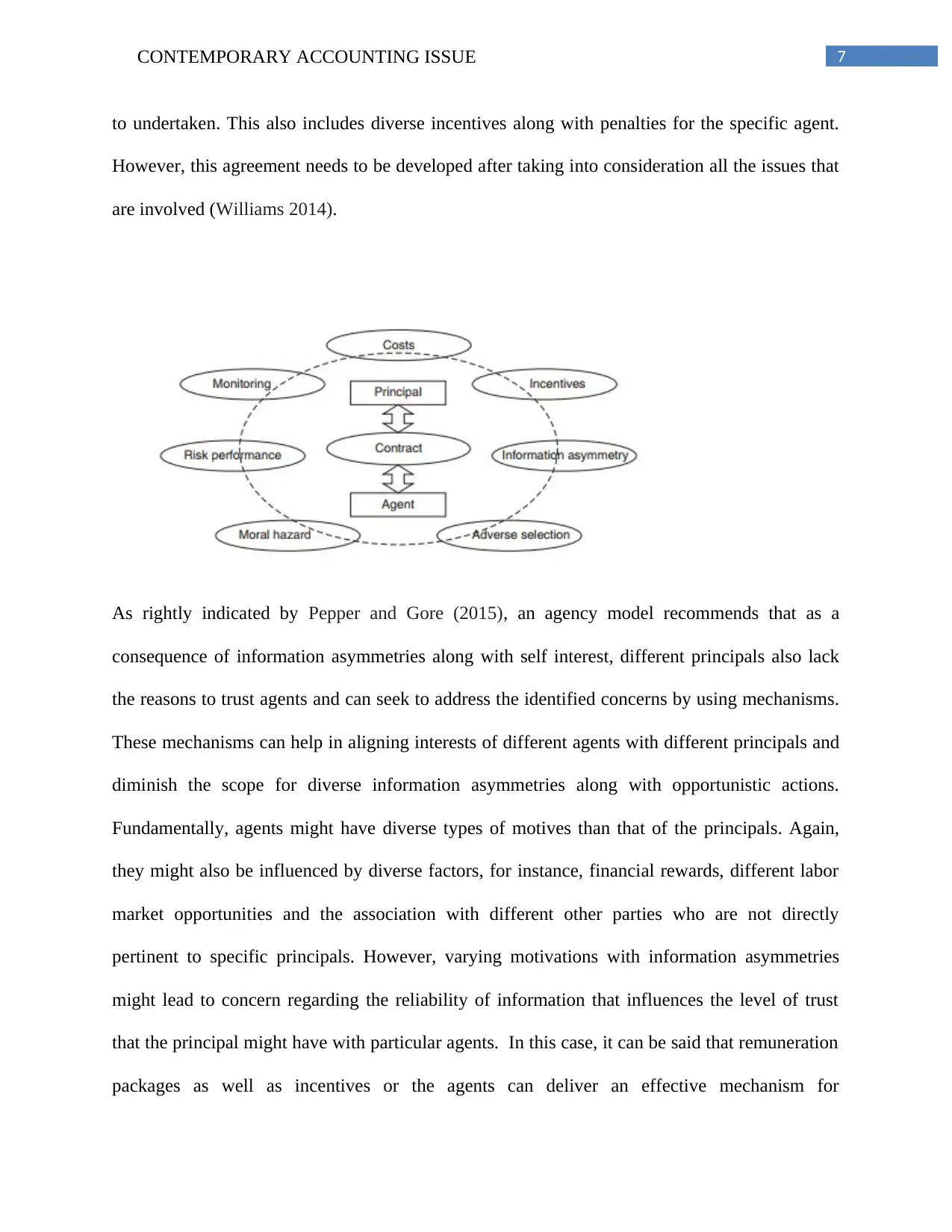
7CONTEMPORARY ACCOUNTING ISSUE
to undertaken. This also includes diverse incentives along with penalties for the specific agent.
However, this agreement needs to be developed after taking into consideration all the issues that
are involved (Williams 2014).
As rightly indicated by Pepper and Gore (2015), an agency model recommends that as a
consequence of information asymmetries along with self interest, different principals also lack
the reasons to trust agents and can seek to address the identified concerns by using mechanisms.
These mechanisms can help in aligning interests of different agents with different principals and
diminish the scope for diverse information asymmetries along with opportunistic actions.
Fundamentally, agents might have diverse types of motives than that of the principals. Again,
they might also be influenced by diverse factors, for instance, financial rewards, different labor
market opportunities and the association with different other parties who are not directly
pertinent to specific principals. However, varying motivations with information asymmetries
might lead to concern regarding the reliability of information that influences the level of trust
that the principal might have with particular agents. In this case, it can be said that remuneration
packages as well as incentives or the agents can deliver an effective mechanism for
to undertaken. This also includes diverse incentives along with penalties for the specific agent.
However, this agreement needs to be developed after taking into consideration all the issues that
are involved (Williams 2014).
As rightly indicated by Pepper and Gore (2015), an agency model recommends that as a
consequence of information asymmetries along with self interest, different principals also lack
the reasons to trust agents and can seek to address the identified concerns by using mechanisms.
These mechanisms can help in aligning interests of different agents with different principals and
diminish the scope for diverse information asymmetries along with opportunistic actions.
Fundamentally, agents might have diverse types of motives than that of the principals. Again,
they might also be influenced by diverse factors, for instance, financial rewards, different labor
market opportunities and the association with different other parties who are not directly
pertinent to specific principals. However, varying motivations with information asymmetries
might lead to concern regarding the reliability of information that influences the level of trust
that the principal might have with particular agents. In this case, it can be said that remuneration
packages as well as incentives or the agents can deliver an effective mechanism for
Paraphrase This Document
Need a fresh take? Get an instant paraphrase of this document with our AI Paraphraser
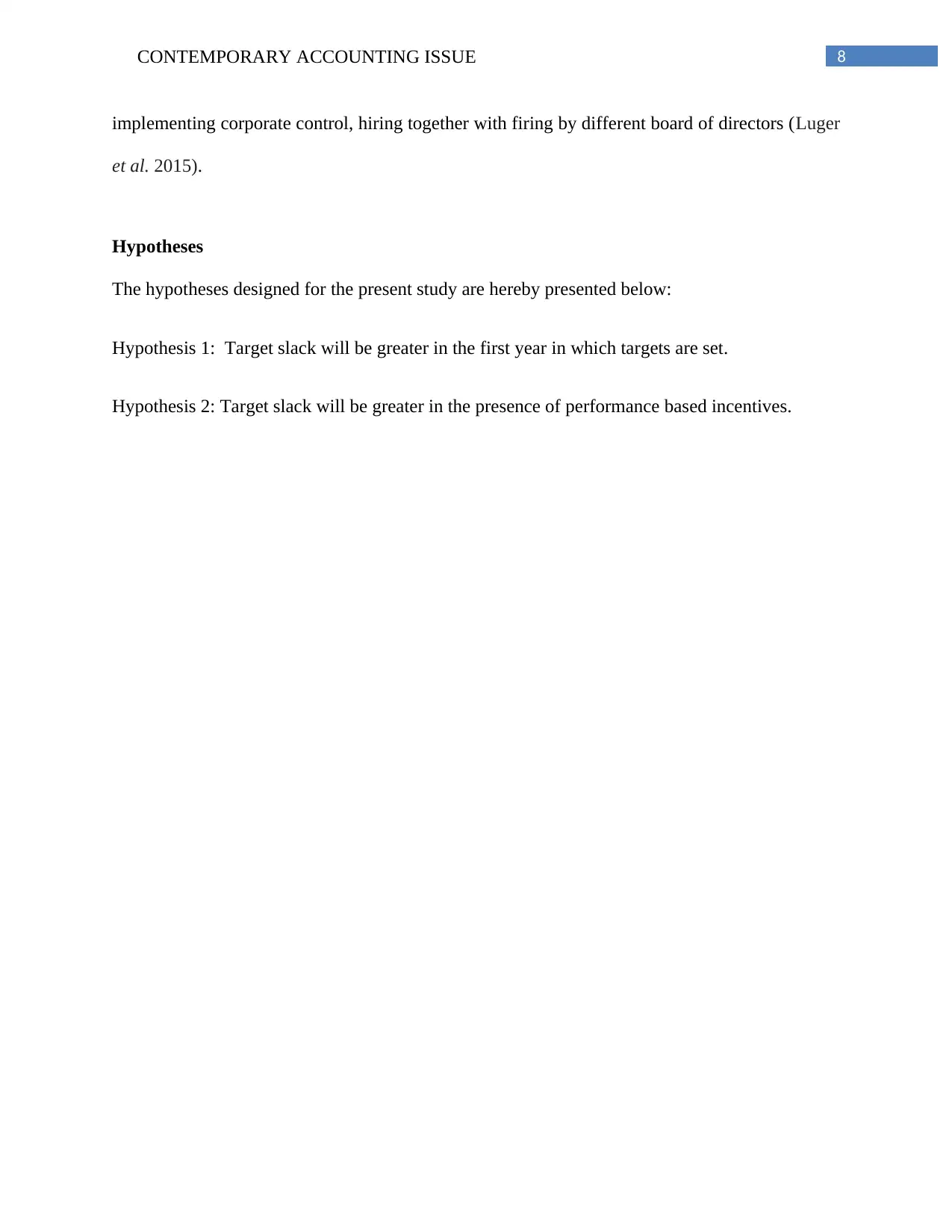
8CONTEMPORARY ACCOUNTING ISSUE
implementing corporate control, hiring together with firing by different board of directors (Luger
et al. 2015).
Hypotheses
The hypotheses designed for the present study are hereby presented below:
Hypothesis 1: Target slack will be greater in the first year in which targets are set.
Hypothesis 2: Target slack will be greater in the presence of performance based incentives.
implementing corporate control, hiring together with firing by different board of directors (Luger
et al. 2015).
Hypotheses
The hypotheses designed for the present study are hereby presented below:
Hypothesis 1: Target slack will be greater in the first year in which targets are set.
Hypothesis 2: Target slack will be greater in the presence of performance based incentives.
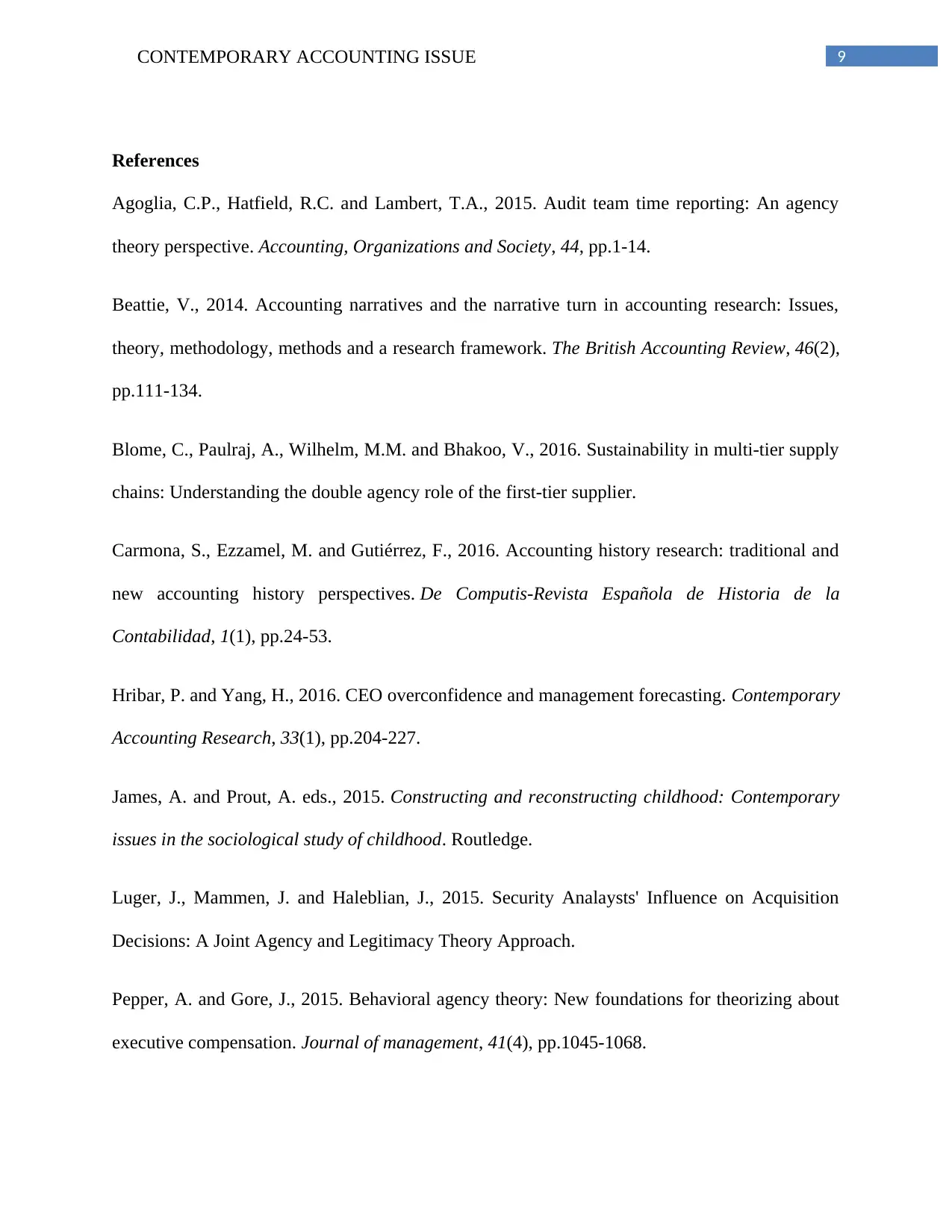
9CONTEMPORARY ACCOUNTING ISSUE
References
Agoglia, C.P., Hatfield, R.C. and Lambert, T.A., 2015. Audit team time reporting: An agency
theory perspective. Accounting, Organizations and Society, 44, pp.1-14.
Beattie, V., 2014. Accounting narratives and the narrative turn in accounting research: Issues,
theory, methodology, methods and a research framework. The British Accounting Review, 46(2),
pp.111-134.
Blome, C., Paulraj, A., Wilhelm, M.M. and Bhakoo, V., 2016. Sustainability in multi-tier supply
chains: Understanding the double agency role of the first-tier supplier.
Carmona, S., Ezzamel, M. and Gutiérrez, F., 2016. Accounting history research: traditional and
new accounting history perspectives. De Computis-Revista Española de Historia de la
Contabilidad, 1(1), pp.24-53.
Hribar, P. and Yang, H., 2016. CEO overconfidence and management forecasting. Contemporary
Accounting Research, 33(1), pp.204-227.
James, A. and Prout, A. eds., 2015. Constructing and reconstructing childhood: Contemporary
issues in the sociological study of childhood. Routledge.
Luger, J., Mammen, J. and Haleblian, J., 2015. Security Analaysts' Influence on Acquisition
Decisions: A Joint Agency and Legitimacy Theory Approach.
Pepper, A. and Gore, J., 2015. Behavioral agency theory: New foundations for theorizing about
executive compensation. Journal of management, 41(4), pp.1045-1068.
References
Agoglia, C.P., Hatfield, R.C. and Lambert, T.A., 2015. Audit team time reporting: An agency
theory perspective. Accounting, Organizations and Society, 44, pp.1-14.
Beattie, V., 2014. Accounting narratives and the narrative turn in accounting research: Issues,
theory, methodology, methods and a research framework. The British Accounting Review, 46(2),
pp.111-134.
Blome, C., Paulraj, A., Wilhelm, M.M. and Bhakoo, V., 2016. Sustainability in multi-tier supply
chains: Understanding the double agency role of the first-tier supplier.
Carmona, S., Ezzamel, M. and Gutiérrez, F., 2016. Accounting history research: traditional and
new accounting history perspectives. De Computis-Revista Española de Historia de la
Contabilidad, 1(1), pp.24-53.
Hribar, P. and Yang, H., 2016. CEO overconfidence and management forecasting. Contemporary
Accounting Research, 33(1), pp.204-227.
James, A. and Prout, A. eds., 2015. Constructing and reconstructing childhood: Contemporary
issues in the sociological study of childhood. Routledge.
Luger, J., Mammen, J. and Haleblian, J., 2015. Security Analaysts' Influence on Acquisition
Decisions: A Joint Agency and Legitimacy Theory Approach.
Pepper, A. and Gore, J., 2015. Behavioral agency theory: New foundations for theorizing about
executive compensation. Journal of management, 41(4), pp.1045-1068.
⊘ This is a preview!⊘
Do you want full access?
Subscribe today to unlock all pages.

Trusted by 1+ million students worldwide
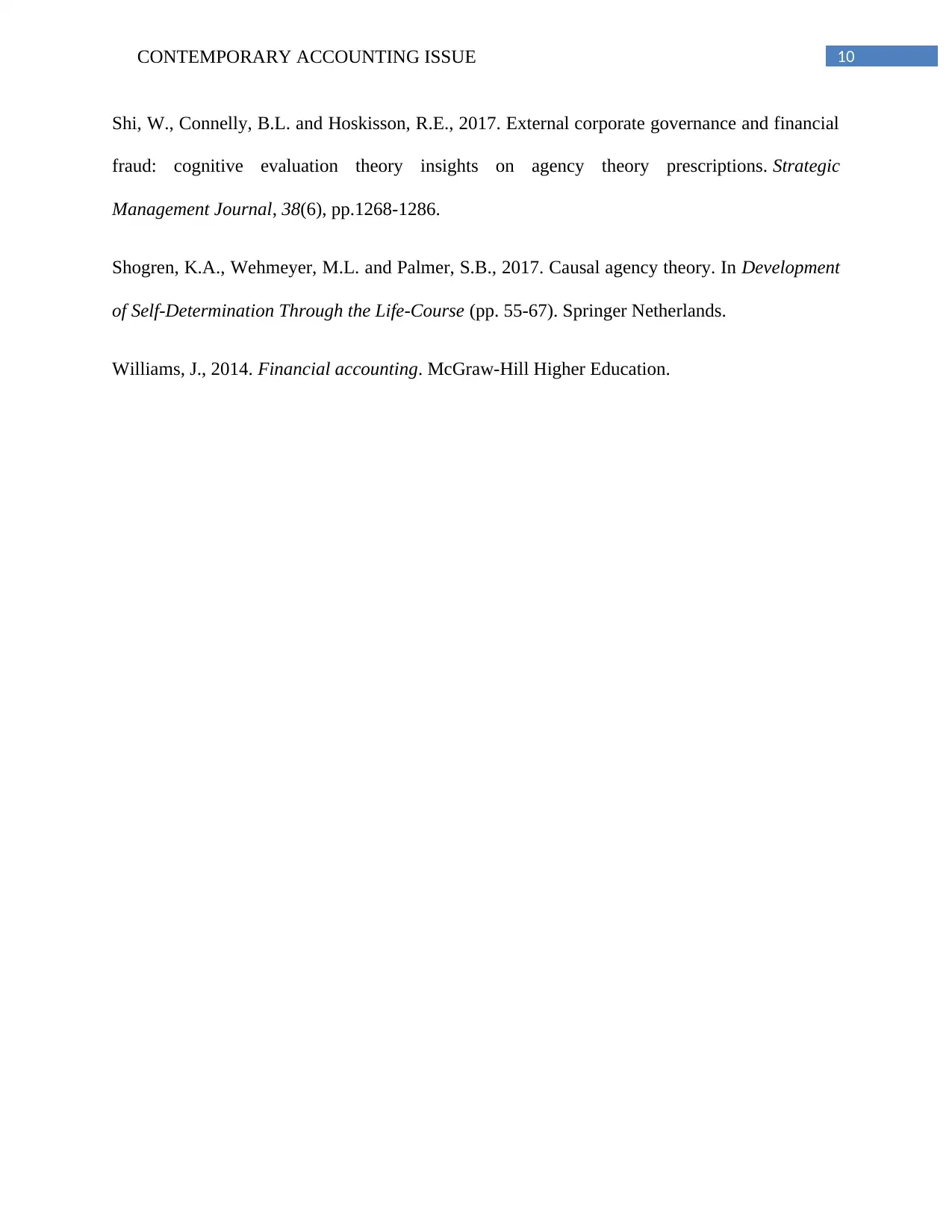
10CONTEMPORARY ACCOUNTING ISSUE
Shi, W., Connelly, B.L. and Hoskisson, R.E., 2017. External corporate governance and financial
fraud: cognitive evaluation theory insights on agency theory prescriptions. Strategic
Management Journal, 38(6), pp.1268-1286.
Shogren, K.A., Wehmeyer, M.L. and Palmer, S.B., 2017. Causal agency theory. In Development
of Self-Determination Through the Life-Course (pp. 55-67). Springer Netherlands.
Williams, J., 2014. Financial accounting. McGraw-Hill Higher Education.
Shi, W., Connelly, B.L. and Hoskisson, R.E., 2017. External corporate governance and financial
fraud: cognitive evaluation theory insights on agency theory prescriptions. Strategic
Management Journal, 38(6), pp.1268-1286.
Shogren, K.A., Wehmeyer, M.L. and Palmer, S.B., 2017. Causal agency theory. In Development
of Self-Determination Through the Life-Course (pp. 55-67). Springer Netherlands.
Williams, J., 2014. Financial accounting. McGraw-Hill Higher Education.
1 out of 10
Related Documents
Your All-in-One AI-Powered Toolkit for Academic Success.
+13062052269
info@desklib.com
Available 24*7 on WhatsApp / Email
![[object Object]](/_next/static/media/star-bottom.7253800d.svg)
Unlock your academic potential
Copyright © 2020–2026 A2Z Services. All Rights Reserved. Developed and managed by ZUCOL.





